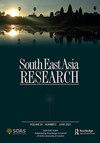混乱状态:私有化暴力与印度尼西亚的国家
IF 0.9
3区 社会学
0 ASIAN STUDIES
引用次数: 1
摘要
在印尼,似乎到处都有半有组织的年轻人,他们可能会制造混乱。从雅加达的停车服务员到婆罗洲丛林里的电锯团伙;从政党的“保安单位”到武术俱乐部;从邻里守望到军事辅助,这些组织往往有多种目的,而不仅仅是声明的目的。在年轻人就业率高企、市场监管不力、精英间政治竞争激烈的环境下,他们在许多层面上都是印尼政治中不守规矩的一面,尽管很上镜。这本书是一个受欢迎的补充,已经广泛的文献关于印尼的政治谋杀。这是一项雄心勃勃的计划。在这部讽刺剧中,一群被称为“preman”的年轻人一直备受争议。书中有一些历史章节,讲述了间接支撑爪哇殖民地种植园经济的半犯罪的爪哇人,以及在1965年协助军队消灭共产党的以宗教为主的帮派。书中有当代部分讲述了北苏门答腊的潘卡西拉青年组织(Pancasila Youth)帮助种植园公司获得他们想要的土地,以及伊斯兰组织在爪哇城市(如索罗和雅加达)恐吓卖酒者和夜总会。有帮助加里曼丹省省长候选人的少数民族帮派,也有试图引导政治走向伊斯兰革命的圣战组织。这本书的中心要旨是,在它们的多样性背后,这些活动都是由一个基本机制驱动的:“掠夺性资本主义”。这是马克思主义“原始积累”概念的另一个术语。马克思想用它来描绘资本主义的早期阶段,在这个阶段,资本家首先通过暴力剥夺他人的生产资料来分离自己。但Mudhoffir认为,这一过程在今天的印尼依然存在。事实上,这些帮派的暴力行为在很大程度上是为了复制原始积累体系,同时阻止它发展成更受监管的现代形式。其他研究preman帮派的作者经常将其视为穷人获得某种代理的工具。相比之下,Mudhoffir认为它们只是强大的国家和商业精英手中的工具。穷人报名参加是出于务实的原因,因为这些破坏性的活动可以赚钱。其中一人告诉他(108):本文章由计算机程序翻译,如有差异,请以英文原文为准。
State of disorder: privatised violence and the state in Indonesia
There seem to be semi-organized young men with a potential for disorder everywhere in Indonesia. From parking attendants in Jakarta to chainsaw gangs in the jungles of Borneo; from ‘security units’ for political parties to martial arts clubs; from neighbourhood watches to military auxiliaries, these groups often serve multiple purposes beyond their stated one. In an environment of high youth underemployment, poorly regulated markets and competitive inter-elite politics, they are an unruly, though photogenic, face of Indonesian politics at many levels. This book is a welcome addition to an already extensive literature about political thuggery in Indonesia. It is an ambitious project. A great range of episodes in which gangs of young men known colloquially as preman have been controversial passes the revue. There are historical sections on the semi-criminal jago that indirectly propped up the colonial plantation economy in Java and on the mostly religious gangs that assisted the military in wiping out the communist party in 1965. There are contemporary sections on the Pancasila Youth groups in North Sumatra helping plantation companies secure the land they want and on the Islamic groups that intimidate alcohol-sellers and nightclubs in Javanese cities like Solo and Jakarta. There are ethnic gangs helping Dayak gubernatorial candidates in Kalimantan and jihadist groups trying to steer politics towards an Islamist revolution. The central thrust of the book is that, behind their diversity, these activities are all driven by one fundamental mechanism: ‘predatory capitalism’. This is another term for the more commonly understood Marxian concept of ‘primitive accumulation’. Marx intended it to portray an early stage of capitalism, in which capitalists first separate themselves by violently expropriating the means of production from others. But Mudhoffir sees the process alive and well in Indonesia today. Indeed, the violence that these gangs practise serves largely to reproduce the system of primitive accumulation, while preventing it from growing into the more regulated modern form. Other authors on preman gangs have often seen them as vehicles by which the poor acquire some agency. Mudhoffir, by contrast, sees them only as instruments in the hands of powerful state and business elites. The poor enrol in them for the pragmatic reason that there is money to be made from these disruptive activities. One of them told him (108):
求助全文
通过发布文献求助,成功后即可免费获取论文全文。
去求助
来源期刊

South East Asia Research
ASIAN STUDIES-
CiteScore
1.90
自引率
0.00%
发文量
42
期刊介绍:
Published three times per year by IP Publishing on behalf of SOAS (increasing to quarterly in 2010), South East Asia Research includes papers on all aspects of South East Asia within the disciplines of archaeology, art history, economics, geography, history, language and literature, law, music, political science, social anthropology and religious studies. Papers are based on original research or field work.
 求助内容:
求助内容: 应助结果提醒方式:
应助结果提醒方式:


